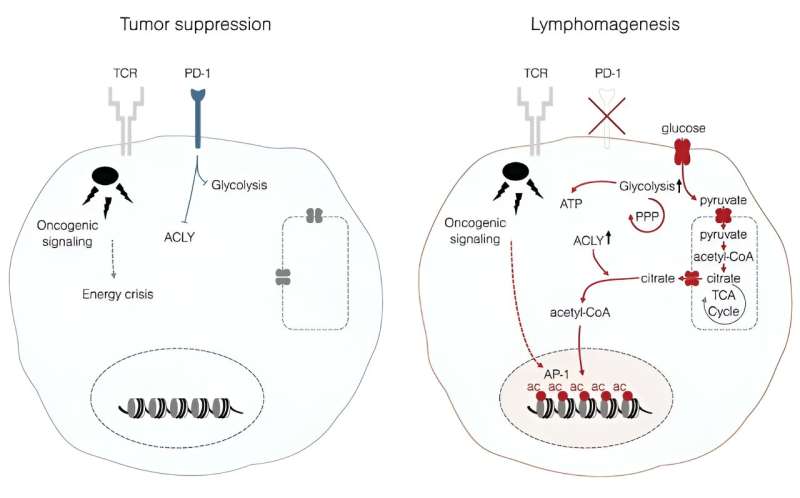This article has been reviewed according to Science X's editorial process and policies. Editors have highlighted the following attributes while ensuring the content's credibility:
fact-checked
peer-reviewed publication
trusted source
proofread
How protein PD-1 controls lymphoma cell metabolism, promotes cancer growth

Northwestern Medicine investigators have discovered how the protein PD-1 controls essential metabolic processes in tumor cells to promote cancer growth in T-cell non-Hodgkin lymphomas (T-NHLs), according to a study published in Nature Cancer.
"We found that PD-1 controls the metabolism of these T-cell lymphoma cells, and these metabolic changes completely reprogram the epigenetics and transcriptional signatures of the T-cell lymphomas themselves," said Jaehyuk Choi, MD, Ph.D., the Jack W. Graffin Professor and associate professor of Dermatology and of Biochemistry and Molecular Genetics. Jay Daniels, a student in the Driskill Graduate Program in Life Sciences (DGP), was co-lead author of the study.
The PD-1 protein, which is encoded by the PDCD1 gene, is known to act as a tumor suppressor in T-NHLs, which causes white blood cells called lymphocytes to grow abnormally and form tumors throughout the body.
The cancer is highly aggressive, and few treatment options are available due to a limited understanding of the mechanisms that drive PD-1 tumor suppression. However, a recent study from the Choi laboratory found that increased PD-1 mutations are actually associated with disease progression and poor prognosis.
To identify these mechanisms, Choi's team performed RNA-sequencing and metabolic imaging to study tumor cells from mouse models of T-NHLs and samples of patient T-NHL tumors. Using these techniques, the investigators discovered that PD-1 restricts and regulates a number of essential metabolic processes within T-cell lymphoma cells, thereby increasing the aggressiveness of the cancer cells.
"We had discovered previously there were 86 driver genes and we were surprised to find that this one mutation [in PD-1] seems to completely govern the lymphoma behavior," Choi said.
The investigators also administered an enzyme inhibitor compound in the PD1-deficient mice, which prevented intracellular signaling in the T-NHL cells.
"Our data suggests that there could be a therapeutic opportunity to target specific pathways using FDA-approved drugs specifically only for the PD-1 mutant lymphomas," Choi said.
In the future, these unique molecular features could be used as criteria for determining the severity and stage of T-NHLs and could improve treatment strategies for patients, according to Choi.
"We're also really interested in trying to figure out whether this should be important criteria for determining how to use current therapies and also how to design clinical trials," Choi added.
More information: Tim Wartewig et al, PD-1 instructs a tumor-suppressive metabolic program that restricts glycolysis and restrains AP-1 activity in T cell lymphoma, Nature Cancer (2023). DOI: 10.1038/s43018-023-00635-7



















